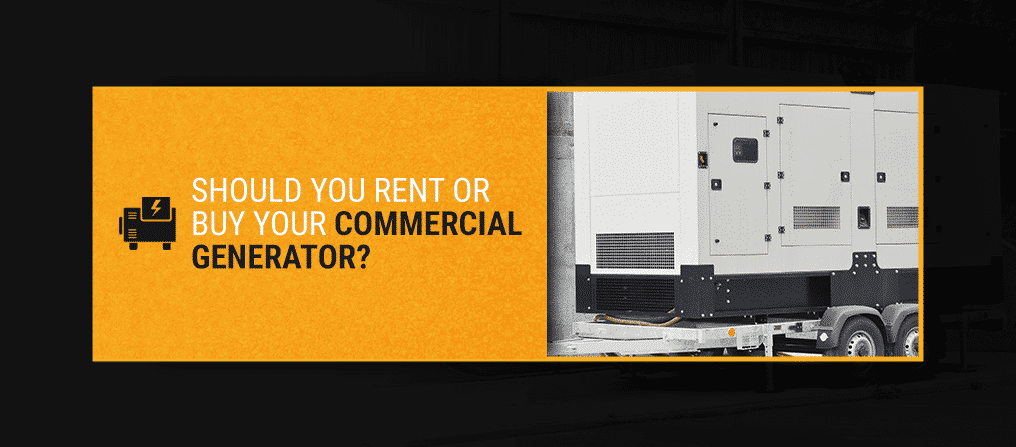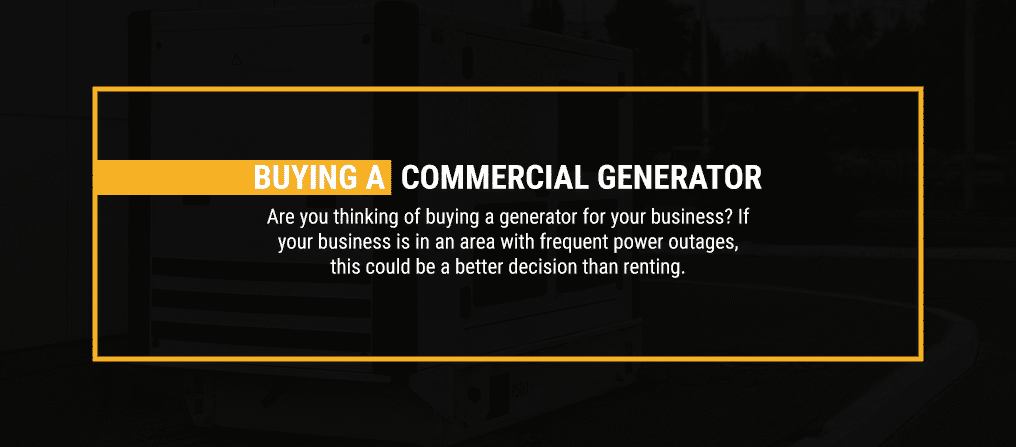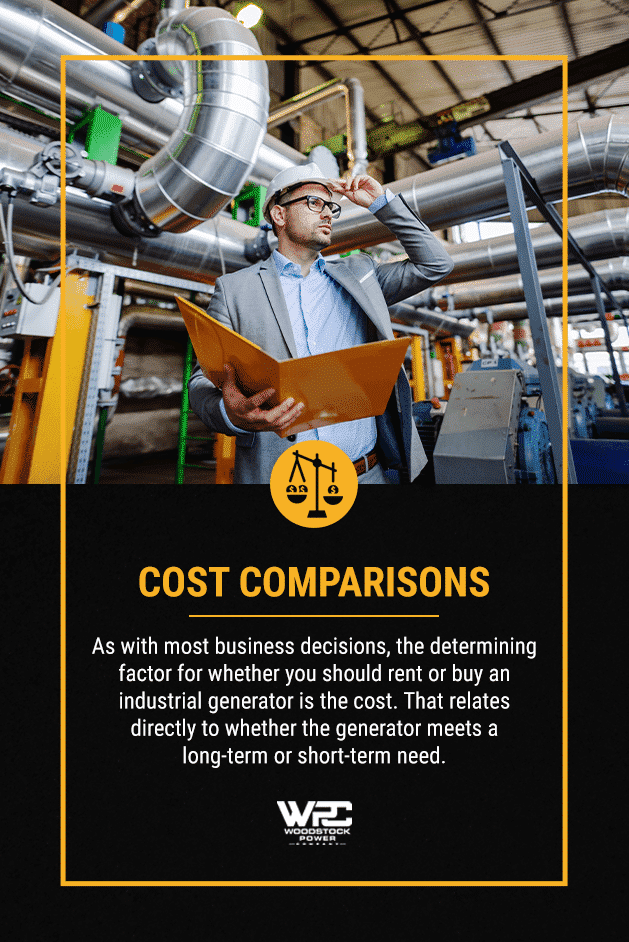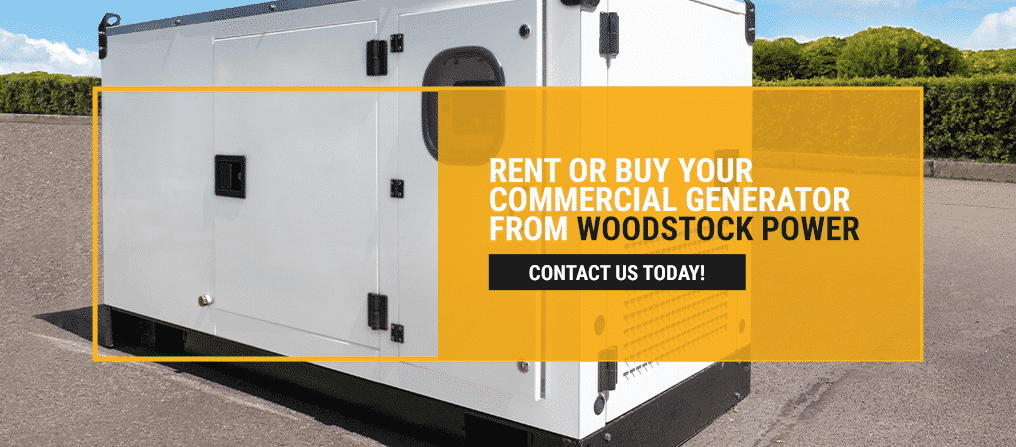Should You Rent or Buy Your Commercial Generator?

As a business owner, you rely on electricity every day to stay productive. Communication, production and your employees’ comfort all rely on electricity. Having a backup generator is a must if you want to keep working during power outages. However, purchasing a backup generator can often be an expensive investment. You may be asking yourself if it’s better to rent or buy a generator for your business.
Whether you rent or buy a commercial generator, you’re making a smart decision to keep your business up and running. But, it may be more cost effective renting over buying. In other circumstances, buying a generator outright is the best call. Read on to find out which decision is right for your business.
Long-Term vs. Short-Term Needs
You need to analyze your specific needs to determine if you will buy or rent your generator. Renting and buying both achieve the same objective — they provide backup power during power outages. But are you looking to meet that goal for the short term or the long haul? Does your business have the capital to invest in a long-term backup power solution? Do you have a recurring need for a backup generator such as being located in an area where natural disasters commonly occur, or is it a rare circumstance in your business timeline?
It sometimes makes more sense to rent a generator, whereas other times it would be wise to buy and own one. Consider both your time frame and the cost. There’s a direct correlation between these two factors, and balancing the two will help you make an informed decision. You need to figure out whether preparing for the long term or the short term is the most cost-efficient solution for your business.

What Are Long-Term Needs?
Long-term needs can last for months or even years. They’re occasions your business plans and sets money aside for within your yearly budget. They don’t catch you off-guard — you expect long-term needs to come, and you’re ready for them. Part of this is because the demand is present for most of the year, and you must consistently satisfy it to keep your business functioning.
Consider a family’s housing situation. If they’re looking to settle down in an area for years to come, they might look into buying a house. Doing so accomplishes two things:
- It meets their needs for the extended period they are preparing for.
- It equips them with a wealth-giving asset that they own.
If this family has the financial means to buy a house, that is the smartest decision to meet their long-term need for shelter. If they were to rent the house for the same period, the cost, in the long run, might surpass the total they would have spent upfront if they bought it.
Money affects this decision. If the family lacks the financial means to buy a house, they could still choose to rent. They meet their housing need with less upfront cost than buying. Many people rent until they have enough money to buy property.
What Are Short-Term Needs?
Short-term needs can arise within your business at any time. They can include securing a temporary office space, renting portable air conditioning units or renting a generator when the power goes out. Short-term needs are rare enough that your business might not factor them into your annual budget. If they do show up, there could be a temporary solution that satisfies the need more inexpensively than buying and owning.
If the family from the above example determines they’ll be moving every couple of years for work, they might decide to rent instead of buy. It makes sense in their situation to find a short-term solution for their housing needs. Buying a house that they will only live in for a year or two seems like an unnecessary expense. Plus, meeting their short-term housing needs could help them save up for the time when they are ready to make a more long-term decision.
The same principles of renting or buying a house apply to your business’ need for a generator.
Renting a Commercial Generator
You might be asking yourself, “Should I rent a generator?” Understand the crucial advantages and disadvantages to help you decide.
Advantages
Here are a few benefits of renting a generator.
- Meet your short-term needs: If you have a temporary energy need, renting a generator will get the job done. Power outages are usually an irregular occurrence for businesses. Renting a generator could be sufficient to get your business through a brief loss of electricity. Once engineers have repaired the electrical grid, you can return the generator and carry on as usual with little capital lost.
- Save money: Renting a generator could save money for your business. Why spend unnecessary money buying a generator you’ll only need for a few weeks or months? Instead, you’ll only be paying for the time you need a generator when you choose to rent. Renting a generator keeps your business up and running while saving capital that you could use for other business expenses.
- Get electricity anywhere: Rented generators are portable. The rental company will bring the equipment where you need it, often on moveable skids or a trailer. You can get energy wherever your business needs it. If you’ll be providing a service in a remote location, renting a generator for the duration of your time there is a business-savvy decision.
- Enjoy renter’s benefits: You can experience other advantages that only renters receive. If the generator malfunctions, the rental company will respond by sending skilled technicians to your location to fix the issue. If the generator you’re renting turns out not to be powerful enough, you can request a new one to meet your needs. The company will pick up your current generator and drop off the new one. They’ll even handle the connections to make things easier on you. Generator dealers that provide rentals also handle routine service & maintenance of their equipment, so you can remove the need to worry about establishing a service contract as you would if you owned a backup generator.
- Short-term real estate: If your business simply does not have the space to install a backup generator on-site, then a portable generator rental is a great short-term solution that can be delivered to your location in events of power outage and picked up when power has been restored.
- Meet seasonal needs: If you are located in an area that experiences seasonal natural disasters such as tornadoes, hurricanes, torrential rains, or snow, but otherwise do not experience power outages throughout the rest of the year – a generator rental may be a sound decision and can help save on costs vs buying and maintaining a backup generator
Disadvantages
Renting has some disadvantages you should keep in mind.
- Timeliness: When energy needs arise, timing is of the essence. That’s especially true if your business deals with frozen or refrigerated foods or disaster relief services. Any business can suffer production loss when the power goes out. If you rely on renting for your generator needs, you might have to go without power for several hours or even days before the company can provide you with one. It is often recommended that you speak with a generator dealer to potentially establish a contract to have a generator rental readily available when needed to mitigate any delays resulting from shipping or generator availability.
- Lack of ownership: While renting offers many flexibilities, it also comes with some restrictions. When you own something, you can do whatever you want or need with it. The same is true with generators. However, when you rent a generator, you’re at the mercy of your contract with the rental company and can be responsible for any damage that may occur to the generator during the rental period.
- Usage caps: When you rent a generator, the rental company may limit your usage based on your contract terms. That means you can only use the generator up to a specific predetermined energy consumption rate. It’s like renting a car — you can only drive it for so many miles during the length of your agreement. If you are using the generator rental around the clock, often referred to as triple shift, these charges are generally more expensive than regular rates. These costs can eventually add up over time and depending on how often you are renting a generator, it may become more cost-effective to purchase and install a stationary generator at your location.

Buying a Commercial Generator
Are you thinking of buying a generator for your business? If your business is in an area with frequent power outages, this could be a better decision than renting when considering need and usage frequency. Compare the advantages and disadvantages of buying a commercial generator to see if it’s the best move for your business.
Advantages
Here are some benefits of buying a backup generator.
- It’s an asset: Like the above example of the family owning a home, owning a generator is an asset to your business. If you ever wanted to sell your used commercial generator, companies such as Woodstock Power Company are always looking to buy. You can use this money to invest in your next generator or any other business expense you might have.
- It provides long-term savings: Eventually, the cost of renting a generator may exceed the cost of owning one depending on how often you rent. Determine how long you’ll need the generator. You might save money buying upfront than renting for that period. If having a backup generator meets a long-term need, consider buying instead of renting.
- Get your energy when you need it: When you own your generator, you’ll always have it on hand. You’ll have access to backup electricity whenever the power goes out. It could take a while for a company to bring you a rental generator. Own a generator to skip the wait time and get right back to work.
- Enjoy ownership: If you ever need to make upgrades your generator for any reason, you have the freedom to do so as the owner. You can also use it as much as you want without any limitations. With no rental agreement to worry about, you can control how and when you use your generator.
Disadvantages
Owning a generator comes with the following downsides.
- Higher cost upfront: It is more expensive in the short term to buy a generator. If your business lacks the capital to buy a generator, renting may be your only option for now.
- Not always portable: Rental generators are usually portable because they have to be ready to go at a moment’s notice. Owned generators are generally stationary. If you ever needed to move your generator, it could be a hassle to disconnect, move and reconnect it in a new location. You’ll have to buy a portable generator if you want more flexibility with location.
- Breakdowns and repairs: You’ll be responsible for maintaining your generator if it breaks down or needs repairs. If your generator is out of commission during a power outage, you could be out of luck. You may end up renting a generator to keep your business afloat while you pay a technician to get your generator working again.

Cost Comparisons
As with most business decisions, the determining factor for whether you should rent or buy an industrial generator is the cost. That relates directly to whether the generator meets a long-term or short-term need. It also depends on how much money your budget allows. If you lack the capital to buy, you may need to pay rental fees until you can afford one. If you only need a generator for a short time, you’re better off renting.
Either way, you’re paying a price to have energy during times of need. Having electricity to get your business through power outages is essential, so renting and buying are both worth the cost. How does the cost of renting a generator compare to buying one? Is there a way to determine which is worth it?
Here are some steps you can take to help you figure out the cost comparison between renting and buying a generator for your business.
- Determine how long you’ll need the generator: Would the generator help your business meet a long- or short-term need? Do you expect power outages to happen consistently? Are they relatively rare events? How long do they generally last? Ask yourself these questions to help you figure out the length of time you’ll need the generator.
- Add up the cost of rental payments for that period: Doing this will give you a larger number that tells you how much you’ll spend in total if you rent the generator. You will gain more perspective on how much money you’ll be paying to rent the generator.
- Compare the total rental price to the purchase price: When you have your estimated rental total, be sure to calculate an estimate of how many times you may need to rent a generator and compare it to the cost of buying the generator. How close are the two prices? Is renting more or less expensive?
Depending on how long you need the generator, you’ll reach a point when the costs are equal. If you need the generator for even longer, you could save money over time when you buy it upfront. If the price is an issue for your business, Woodstock Power Company offers industrial generator financing options to make it more affordable.
Another factor that affects the price of renting or buying is generator size. More powerful generators are correspondingly more expensive, but they could be necessary to give your business the energy it needs. Use our online power calculator to help you assess what size generator you should rent or buy.
Rent or Buy Your Commercial Generator From Woodstock Power
Woodstock Power Company is your solution to your generator needs. Whether you are renting or buying, we can meet your needs with the right generator for your business. We invite you to browse our extensive generator inventory to help you with your search. We know generators can be expensive. That’s why we aim to offer the most affordable prices on the market, and match them with industry-leading customer service. We’ll help you through every step of the process of getting a generator for your business.
Call us at 610-658-3242 to inquire about sales. Or, you can contact us online to get in touch and learn more. No matter your generator needs, Woodstock Power Company is the answer!


